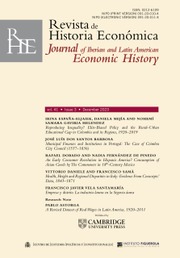The traditional editorial note of this year begins with the changes in the editorial team. As announced last year Blanca Sánchez-Alonso took over as chief editor in January 2013. Adolfo Meisel Roca relinquished his position as co-editor since last February 2013 because of his appointment as co-director of the Bank of the Republic of Colombia. We congratulate Adolfo on his new post and thank him for his time as editor.
The protocol to look for a new editor was quickly activated and the Search Committee (Pablo Martín Aceña as director of the Board of Trustees, Bill Summerhill as co-editor and Blanca Sanchez-Alonso as chief editor) started work. After several consultations with members of the editorial board, Professor Sandra Kuntz Ficker, a member of the editorial board and an active collaborator of the Revista, accepted our proposal to join the team of editors. Her appointment was ratified by the RHE-JILAEH Board of Trustees at its annual meeting in July 2013.
In addition to the changes in the editorial team (it was also decided to eliminate the post of associate editor), the Journal has partially renewed the composition of the editorial board with the following criteria: to incorporate researchers from early modern history in order to broad the chronological spectrum, to include academics from more different countries in Latin America and also several specialists in disciplines related to economic history such as historical demography and, finally, to replace those members of the editorial board with long periods of service. The editors would like to take this opportunity to reiterate their gratitude to those colleagues who have been members of the editorial board for their invaluable collaboration all these years.
The best news of the year 2013 was the publication of the Impact Factor index for the Revista de Historia Económica – Journal of Iberian and Latin American Economic History according to Thomson-Reuters Journal Citation Report 2012. Our impact factor index increased from 0.25 to 0.545 and RHE-JILAEH jumped to number 14 in the ranking of journals in “History” and “History of Social Sciences” categories. It is important to underline that RHE-JILAEH has an impact factor (0.545) which is the highest among all the Spanish journals included in the JCR-Social Sciences Citation Index in the “Economics” category.
The Journal has also renewed the Quality Seal of the FECYT after complying with the 12 quality variables of the evaluation process; this allows the Journal to be classified as Excellent. The H-index for Spanish scientific publications according to Google Scholar Metrics (2007-2011) was also published. According to this index, RHE-JILAEH appears in the first place in History and in the third place in Economics.
All this good news is thanks to the work of previous editors and members of the editorial board in recent years, as well as the extraordinary collaboration of the referees of the RHE-JILAEH whose names are listed at the end of this editorial note.
We would like to mention the following points as far as changes in the Journal's statistics in 2013 in comparison with earlier years are concerned. The RHE-JILAEH received 23, 30, 41, 46, 57, 44, 43 and 54 original research papers in the years from 2006 to 2013 respectively. The increase in the number of original research articles received in 2013 has been remarkable.

FIGURE 1 NUMBER OF ORIGINAL ARTICLES SUBMITTED TO RHE-JILAEH, 2006-2013
The percentage of original manuscripts received dealing with Latin American history is nearly 50 per cent of the total, while there has been a fall in the numbers of original research papers on Spanish and Portuguese history received during the last year. Our rejection rate of around 70% hardly changed in 2013.

FIGURE 2 REGIONAL DISTRIBUTION OF TOPICS. TOTAL ARTICLES RECEIVED IN 2013
We would like conclude by expressing our gratitude to our team of referees for their work through 2013. Their contribution is essential to improve the quality of the articles published. We are well aware that much of the success of this publication is the result of the professionalism and generosity with their time of the long list of international referees whose names are included in the following list:
STATISTICS FOR EVALUATION PERIODS AND THE SITUATION OF ORIGINAL RESEARCH PAPERS DURING 2013
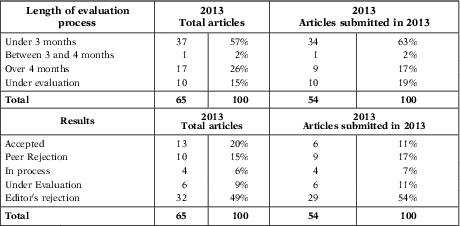
GEOGRAPHICAL DISTRIBUTION AND TOPICS OF TOTAL ARTICLES IN 2013
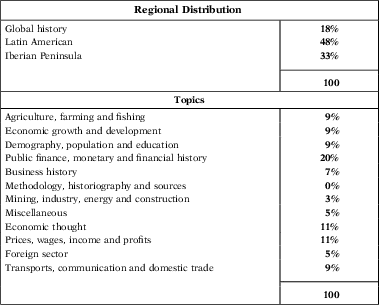
REJECTION RATE
NOTA DE LOS EDITORES
La tradicional nota editorial de este año comienza dando cuenta de los cambios en el equipo de editores. Tal y como se anunció el año pasado Blanca Sánchez-Alonso se hizo cargo de la dirección en enero de 2013. Adolfo Meisel Roca tuvo que abandonar su responsabilidad como editor a partir de febrero de 2013 como consecuencia de su nombramiento como co-director del Banco de la República de Colombia. Nuestra felicitación a Adolfo por su nombramiento y nuestro agradecimiento por su labor como editor.
El procedimiento previsto para la sustitución de editores se activó de forma rápida y se constituyó el comité de búsqueda (Pablo Martín Aceña como director del Patronato, Bill Summerhill, como co-editor y Blanca Sánchez-Alonso como editora-responsable). Tras varias consultas y gestiones entre algunos miembros del Consejo Editorial, la profesora Sandra Kuntz Ficker, colabora activa de la Revista y miembro del Consejo Editorial, aceptó incorporarse al equipo de editores. Su nombramiento fue ratificado por el Patronato de la Revista en su reunión anual de julio de 2013.
Al hilo de los cambios en la cabecera de editores (se ha suprimido también el puesto de editor-adjunto), la Revista ha procedido a una renovación parcial del Consejo Editorial con los siguientes criterios: ampliar el arco cronológico de especialistas con particular interés en incorporar a investigadores de la Edad Moderna, incluir a profesores de más países de América Latina y de disciplinas afines a la historia económica como la demografía histórica y sustituir a aquellos miembros del consejo editorial que llevaban más tiempo. Los editores quieren aprovechar la ocasión para reiterar su agradecimiento a todos los que han sido miembros del Consejo Editorial por su valiosa colaboración con la Revista durante todos estos años.
La mejor noticia del año 2013 fue la publicación del Índice de Impacto de la Revista de Historia Económica – Journal of Iberian and Latin American Economic History según el Journal Citation Report 2012 de Thomson-Reuters. La revista ha aumentado el índice de impacto desde el 0,25 a 0,545, y ha subido hasta el puesto 14º en las categorías ‘History’ y “History of Social Sciences”. Conviene resaltar que RHE-JILAEH presenta un índice de impacto (0,545) que resulta ser el más elevado de entre todas las revistas españolas que aparecen incluidas en el JCR-Scocial Sciences Citation Index en la categoría de Economía.
La Revista ha renovado también el Sello de Calidad de la FECYT tras aprobar la evaluación de los 12 indicadores de calidad establecidos lo que permite que pueda seguir siendo calificada como EXCELENTE. Se ha publicado también el Índice H de las revistas científicas españolas según Google Scholar Metrics (2007-2011) a partir del recuento de citas que ofrece Google Scholar. La Revista ocupa el primer lugar en Historia y el tercero en Economía, según el citado Índice H.
Todos estos datos positivos se deben a la labor realizada por los editores y miembros del consejo editorial en los años anteriores, así como a la extraordinaria colaboración de los evaluadores de RHE-JILAEH cuyos nombres figuran al final de esta Nota Editorial.
En relación a las novedades que ofrecen nuestras estadísticas para el año 2013 en relación con años anteriores se podrían comentar brevemente los siguientes aspectos. La recepción de originales de investigación recibidos por RHE-JILAEH ha sido de 23, 30, 41, 46, 57, 44, 43 y 54 respectivamente entre los años 2006 y 2013. El crecimiento en el número de artículos recibidos en este año ha sido notable.

FIGURE 1 NUMBER OF ORIGINAL ARTICLES SUBMITTED TO RHE-JILAEH, 2006-2013
El porcentaje de artículos recibidos sobre temas de historia de América Latina se acerca al 50 por ciento del total y ha descendido el número de artículos enviados que se ocupan de temas relativos a la historia de España y Portugal. Nuestra tasa de rechazo se sitúa, haciendo una media entre los artículos en activo y los recibidos en el año 2013 alrededor del 70% sin cambios significativos con relación al año anterior.

FIGURE 2 REGIONAL DISTRIBUTION OF TOPICS. TOTAL ARTICLES RECEIVED IN 2013
No queremos terminar sin agradecer a nuestros evaluadores su labor a lo largo del año 2013. Su contribución es fundamental para mejorar la calidad de los artículos de la Revista. Somos conscientes de que una parte importante del éxito de esta publicación se la debemos a la profesionalidad y a la generosidad con su tiempo de nuestro amplio plantel de evaluadores internacionales cuyos nombres publicamos a continuación.
ESTADÍSTICAS DE LOS TIEMPOS DEL PROCESO DE EVALUACIÓN DURANTE EL AÑO 2013
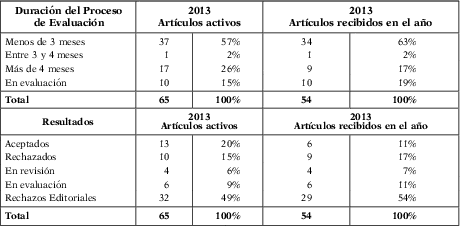
DISTRIBUCIÓN Y TEMAS DE LOS ARTÍCULOS EN 2013
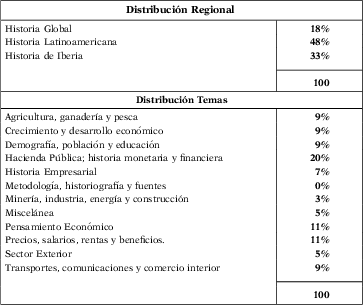
IMPACTO
ACKNOWLEDGEMENT TO REFEREES IN 2013
RECONOCIMIENTO A EVALUADORES EN 2013


